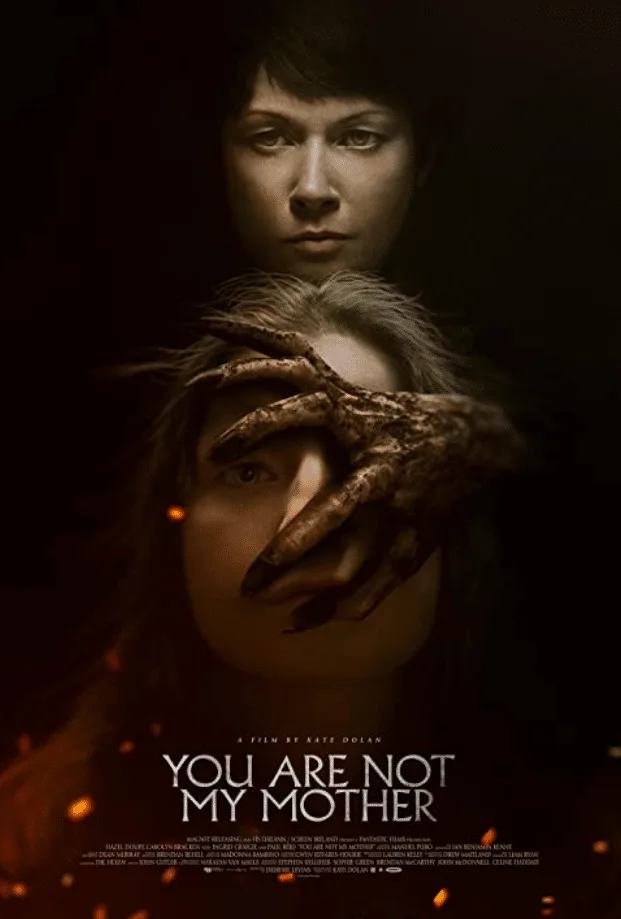
From its very earliest moments, as the camera oh-so slowly approaches a baby’s buggy parked in the middle of a street – it’s clear that You Are Not My Mother is a film which will allow itself ample time, not rushing through anything it wants to show. And, as it segues almost straight away into more strangeness, laced with peril which is yet to become clear to us, it seems there is a hideous something underpinning this world, even if it’s a recognisable-seeming world – actually a modern housing estate in North Dublin.
Here, Char (The Green Sea‘s Hazel Doupe) lives with her mother and grandmother. Each of these women have issues which are keeping them at a distance from Char: granny Rita has physical ailments, whilst mother Angela has more complex reasons for wanting to hide from the world. She struggles to be out of doors and seems on the verge of a(nother) crisis when Char asks her to drive her to school one morning; some simple demands from her daughter prove too much. Char takes herself the rest of the way and school, were it not for the presence of her classmates, would be a much-needed bit of security. She’s progressing well, academically-speaking, and so far there are hints only at a darkness in her own life, ticking patiently along in the background. That is all to change.
At the end of the school day, Char is alarmed to find her mother’s car – abandoned, though with the bag of groceries that her mam had seemed so unlikely to actually go and buy left on the passenger seat. The family reports her missing, their worry increasing as it becomes clear the police can do little at this stage. But, that night, late that night Angela comes home: she’s different somehow, even if she was always distant (or had been for long enough for it to become the norm). Angela’s sudden interest in the household, and her daughter is…nice, at first, but it’s oddly out of character, and the cracks soon start to show. Angela’s behaviour becomes disturbing. Who is she?

You Are Not My Mother is immediately immersive; its performances, script and pacing do everything right to subtly establish that there is a lot of hurt, a lot of anxiety brewing here – and that’s before the storyline proper really kicks in. One of the ways it works brilliantly is in its exploration of how precarious the teenage years can be – here we have a teenager who is bright, active, fairly independent with a list of responsibilities, but still financially and emotionally very vulnerable. Hazel Doupe is fantastic at this, all the while never once seeming like she’s been abandoned by anyone in her family. This is a loving family unit, but the hinterland which Char finds herself in is explored deftly, particularly as the unease she feels outside the home, follows her back there. And, whilst her uncle (Paul Reid) tries to keep order as a kind of proxy head of the household, he’s soon shunted aside: this is a very female-led film, with the relationships between mothers and daughters becoming claustrophobic, uncanny and intimidating. The role of grandmother Rita (Ingrid Craigie) is incredibly well-written whilst retaining that subtle, no-need-to-provide-every-detail approach which runs throughout. It’s enough that she’s the matriarch, the lynchpin of the family and the keeper of secrets, only sharing knowledge when she must. It’s also entirely in keeping with the mythology referenced here that we have a bean feasa of sorts, a woman ‘in the know’ who also lives in the here and now, juggling her roles.
If any pre-existing film comes to mind as having similarities with You Are Not My Mother, it would be Honeymoon (2014): this earlier film shares some of the same careful exploration of personhood. However, You Are Not My Mother takes for its basis Celtic mythology – still a criminally-underexplored seam of stories in film – and watching it thread its way into Char’s life is extraordinary. It seems that the normality of modern Dublin is as vulnerable to the old ways as ever and, significantly, not retaining that folk knowledge worsens the risks. Seeing how the film uses fire as a symbol and part of the plot, given how it continues to occupy an important, often contentious role in modern Ireland, shows how it successfully forges a link between past and present. And, if some aspects of this folklore have been diluted and sanitised over the years, it’s worth remembering that what our ancestors were afraid of – malign strangers, the breaking of family bonds – is still a key driver in stories, particularly in horror cinema. If some aspects of old beliefs have been Disneyfied over time, horror has always adapted the same fears and kept them going; the means to explore the same old anxieties have morphed and developed. It’s just wonderful to see old folklore and new medium brought together so effectively, just as it is here.
Magic and folklore, first taking place on the edge of the narrative, eventually weave jarringly into everyday life, amplifying very modern, but timeless preoccupations: isolation, mental illness (by whatever name), friendships, family. An intensely character-driven story, You Are Not My Mother balances its poignancy against genuine, profound unease. Its pacing and attention to detail are remarkable, and it’s an incredible achievement from first-time feature director Kate Dolan.
Signature Entertainment and FrightFest Presents You Are Not My Mother (2021) on 8th April 2022 (UK cinemas/digital).
